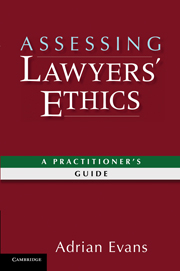Book contents
- Frontmatter
- Contents
- Preface
- List of figures
- Acknowledgements
- 1 An opportunity for law societies
- 2 Ethical failures, research and core qualities
- 3 Understanding ethical methods and types
- 4 Mechanisms to offset business pressure on legal ethics
- 5 Discovering practitioners' opinions about ethics assessment and psychological testing for integrity
- 6 Developing character
- 7 Measuring awareness of values and ethics
- 8 Entrenching ethics assessment
- Appendix A Research methods
- Appendix B Awareness of ethical type
- Appendix C Prototype scale of preference for legal ethical type
- Index
3 - Understanding ethical methods and types
Published online by Cambridge University Press: 10 January 2011
- Frontmatter
- Contents
- Preface
- List of figures
- Acknowledgements
- 1 An opportunity for law societies
- 2 Ethical failures, research and core qualities
- 3 Understanding ethical methods and types
- 4 Mechanisms to offset business pressure on legal ethics
- 5 Discovering practitioners' opinions about ethics assessment and psychological testing for integrity
- 6 Developing character
- 7 Measuring awareness of values and ethics
- 8 Entrenching ethics assessment
- Appendix A Research methods
- Appendix B Awareness of ethical type
- Appendix C Prototype scale of preference for legal ethical type
- Index
Summary
Awareness of ethical issues
Trust is central to legal ethics, but such trust involves more than a client placing trust in their lawyer. The wider domain of trust involves society being able to trust its lawyers to prioritise the interests of justice over all else. And if this sort of social trust is to mean anything tangible, there must be some method by which lawyers' trustworthiness can be reasonably inferred. One way to approach this goal is to assess whether lawyers are, at a minimum, aware of ethical issues.
Traditionally, both types of trust – individual trust of a client and the broader notion of social trust – have been inferred in lawyers through the mostly secretive and very ‘broad brush’ admission process. Admission mechanisms try to deal with the need to have trustworthy lawyers by somewhat illogically asking candidates for admission to demonstrate their ‘good’ character by showing that they have no ‘bad’ behaviour in their past. Of course, the acknowledgement of past bad behaviour does have the virtue of allowing society, through the admission regulator, to consider if future good behaviour is likely or not in a particular individual, but the admission process in most jurisdictions is ill-suited to predict future good behaviour from the absence of a ‘past’. It relies on a negative to infer a positive.
Assessment of ethical consciousness or awareness improves on the current admission process as a method of inferring future ‘good’ behaviour.
- Type
- Chapter
- Information
- Assessing Lawyers' EthicsA Practitioners' Guide, pp. 62 - 91Publisher: Cambridge University PressPrint publication year: 2010

